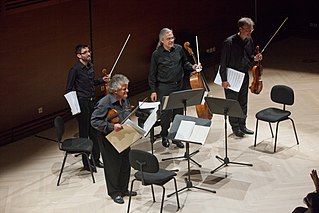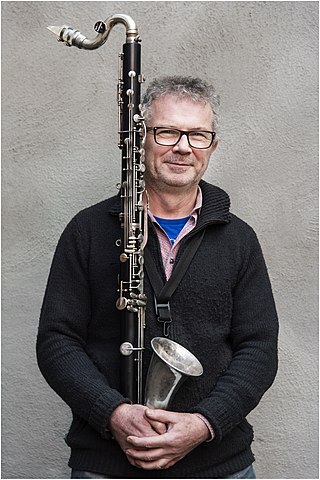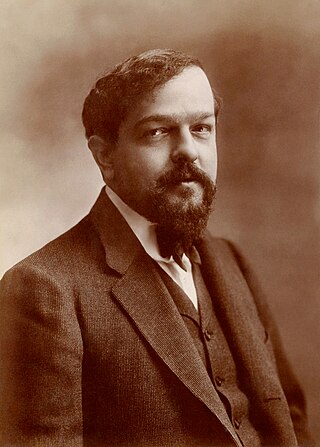Related Research Articles

The Arditti Quartet is a string quartet founded in 1974 and led by the British violinist Irvine Arditti. The quartet is a globally recognized promoter of contemporary classical music and has a reputation for having a very wide repertoire. They first became known taking into their repertoire technically challenging pieces. Over the years, there have been personnel changes but Irvine Arditti is still at the helm, leading the group. The repertoire of the group is mostly music from the last 50 years with a strong emphasis on living composers. Their aim from the beginning has been to collaborate with composers during the rehearsal process. However, unlike some other groups, it is loyal to music of a classical vein and avoids cross-genre music. The Quartet has performed in major concert halls and cultural festivals all over the world and has the longest discography of any group of its type. In 1999, it won the Ernst von Siemens Music Prize for lifetime achievement, being the first and only group to date to receive this award.

Verklärte Nacht, Op. 4, is a string sextet in one movement composed by Arnold Schoenberg in 1899. Composed in just three weeks, it is considered his earliest important work. It was inspired by Richard Dehmel's poem of the same name and by Schoenberg's strong feelings upon meeting his future wife Mathilde Zemlinsky, who was the sister of his teacher, Alexander von Zemlinsky (1877–1942). Schoenberg and Zemlinsky married in 1901. The movement can be divided into five distinct sections which refer to the five stanzas of Dehmel's poem; however, there are no unified criteria regarding movement separation.

Barry John Guy is an English composer and double bass player. His range of interests encompasses early music, contemporary composition, jazz and improvisation, and he has worked with a wide variety of orchestras in the UK and Europe. He studied at the Guildhall School of Music under Buxton Orr, and later taught there.

Gerald Barry is an Irish composer.

Peter Vermeersch is a Belgian composer, clarinet player and producer.
Cheryl Frances-Hoad is a British composer.

Nicolas Bacri is a French composer. He has written works that include seven symphonies, eleven string quartets, eight cantatas, two one-act operas, three piano sonatas, two cello and piano sonatas, four violin and piano sonatas, six piano trios, four violin concertos and numerous other concertante works.
Raymond Yiu, born 1973; is a composer, conductor, jazz pianist and music writer.
Peter Fribbins is a British composer. He studied music at the Royal Academy of Music, Royal Holloway and Nottingham universities, and composition with Hans Werner Henze in London and Italy.
Charlotte Bray is a British composer. She was championed by the Royal Opera House Covent Garden, London Sinfonietta and Birmingham Contemporary Music Group, BBC Symphony Orchestra. Her music has been performed by many notable conductors such as: Sir Mark Elder, Oliver Knussen, Daniel Harding, and Jac van Steen.
Route 66 is a single-movement composition for orchestra by the American composer Michael Daugherty. The piece was commissioned by the Kalamazoo Symphony Orchestra and premiered on April 25, 1998, at the Irving S. Gilmore International Keyboard Festival in East Lansing, Michigan under conductor Yoshimi Takeda.
Sunset Strip is an orchestral composition in three movements by the American composer Michael Daugherty. The piece was composed in 1999 and premiered January 7, 2000 at the Ordway Center for the Performing Arts in Saint Paul, Minnesota, with conductor Hugh Wolff leading the Saint Paul Chamber Orchestra.
Stockholm Diary is a composition for string orchestra by the Finnish composer Esa-Pekka Salonen. The work was commissioned by the Stockholm Concert Hall Foundation for the Royal Stockholm Philharmonic Orchestra and the Stockholm Chamber Orchestra. It was first performed in Stockholm, October 27, 2004, by the Royal Stockholm Philharmonic Orchestra under Salonen.
The Cello Concerto is a concerto for solo cello and orchestra by the American composer Nico Muhly. The work was commissioned by the Barbican Centre for the Britten Sinfonia and cellist Oliver Coates, to whom Muhly dedicated the piece. It was first performed on March 16, 2012 at the Barbican Centre by Coates and the Britten Sinfonia under conductor André de Ridder.
Caught in Treetops is a concerto for solo violin and chamber ensemble by the British composer Charlotte Bray. The work was commissioned by the Birmingham Contemporary Music Group and Sound and Music. It was first performed on 14 November 2010 at the CBSO Centre, Birmingham by the violinist Alexandra Wood and the Birmingham Contemporary Music Group under conductor Oliver Knussen. The piece is dedicated to the Birmingham Contemporary Music Group.
The Glory Tree is a song cycle for solo soprano and chamber ensemble by the British composer Cheryl Frances-Hoad. It was first performed in the Purcell Room at the Southbank Centre in June 2005.
Guide to Strange Places is an orchestral composition by the American composer John Adams. The work was commissioned by the Amsterdam broadcasting company VARA, the BBC Symphony Orchestra, and the Sydney Symphony Orchestra. It was given its world premiere by the Netherlands Radio Philharmonic Orchestra under the direction of Adams at the Concertgebouw, Amsterdam, on October 6, 2001.
Joseph Wilson Baber Jr. was an American composer, violist, and composition teacher living in Lexington, Kentucky.

Trois Chansons, or Chansons de Charles d’Orléans, L 99 (92), is an a cappella choir composition by Claude Debussy set to the medieval poetry of Charles, Duke of Orléans (1394–1465). Debussy wrote the first and third songs in 1898 and finished the second in 1908. He premiered the piece in 1909 and Trois Chansons is his only composition for unaccompanied choir.
Last Man Standing is a song cycle for baritone and orchestra written in 2018 by the British composer Cheryl Frances-Hoad and set to a text by Tamsin Collison. The work was commissioned by BBC Radio 3 and was first performed by the baritone Marcus Farnsworth and the BBC Symphony Orchestra conducted by Martyn Brabbins at the Barbican Centre on 30 November 2018.
References
- 1 2 3 Frances-Hoad, Cheryl (2007). The Ogre Lover: Program Note. Retrieved August 12, 2015.
- 1 2 Clements, Andrew (August 25, 2011). "Frances-Hoad: The Glory Tree; The Ogre Lover; Melancholia, etc – review". The Guardian . Retrieved August 12, 2015.
- 1 2 Witherden, Barry (January 20, 2012). "The Glory Tree". BBC Music Magazine . Retrieved August 12, 2015.
- ↑ Hewett, Ivan (June 28, 2011). "Cheryl Frances-Hoad: The Glory Tree; other chamber works, CD review". The Daily Telegraph . Telegraph Media Group . Retrieved August 12, 2015.